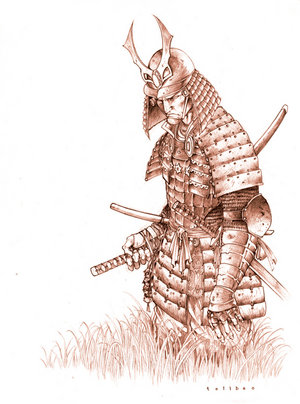Bushido: The Way of the Samurai
By Renshi Aaron Kenneally

Samurai Bushido Warrior
Bushido, often referred to as the "way of the warrior," is a code of conduct and moral philosophy that guided the behaviour and principles of the samurai, the noble warriors of feudal Japan. Rooted in Japanese culture, history, and Zen Buddhism, Bushido governed the samurai's actions on the battlefield and shaped their entire way of life. In this article, we will delve into the essence of Bushido, its fundamental principles, and its enduring significance in Japanese society and beyond.
Origins of Bushido
Bushido's origins can be traced back to the Heian Period (794-1185), when the samurai first emerged as a class of warriors. Initially, samurai were primarily protectors and warriors for landowners and nobles. However, as their role evolved, so did their code of conduct.
The Bushido Ethos
At its core, Bushido emphasises several key principles and virtues that governed the actions and mindset of the samurai:
-
Loyalty (Chuugi): Loyalty was paramount in Bushido. Samurai were expected to be unwaveringly devoted to their lords and masters, ready to serve them even at the cost of their lives. This loyalty was considered the foundation of the samurai's honour.
-
Honour (Hokori): Maintaining one's honour was paramount. Samurai were expected to adhere to a strict code of ethics, which included honesty, integrity, and moral uprightness. To lose one's honour was a grievous offence.
-
Courage (Yuuki): Fearlessness in the face of death or adversity was a fundamental virtue. Samurai were trained to confront challenges and enemies with bravery, even when outnumbered or outmatched.
-
Respect (Sonkei): Respect for others, especially one's superiors, was integral to Bushido. Etiquette, manners, and courteous behaviour were highly valued. Disrespect was considered a grave breach of the code.
-
Benevolence (Jin): Benevolence and compassion were not weaknesses in Bushido but strengths. Samurai were expected to show kindness and empathy toward the weak and vulnerable.
-
Integrity (Makoto): Truthfulness and sincerity were essential. Samurai were taught to be honest and straightforward in their actions and words.
-
Duty (Giri) Fulfilling one's obligations and responsibilities was seen as a noble act. Samurai had duties not only to their lords but also to their families and society.
-
Frugality (Kan): Living modestly and avoiding extravagance promoted discipline and self-control. The samurai were encouraged to lead simple lives.
-
Self-Control (Jisei): Maintaining emotional balance and self-discipline was vital. Samurai were taught to control their impulses and emotions, especially during stress or conflict.
Zen Buddhism and Bushido
Zen Buddhism played a significant role in the development of Bushido. Zen teachings, emphasising mindfulness, inner peace, and self-reflection, resonated deeply with the samurai's quest for self-improvement and mastery of their emotions. Zen also promoted living in the present moment, a valuable mindset on the battlefield and in daily life.
Bushido in Practice
The principles of Bushido were not merely theoretical; they were put into practice by the samurai in various aspects of their lives:
-
Combat: In battle, samurai adhered to the virtues of courage, honour, and loyalty. They fought with courage and dedication, fully aware of the risks involved.
-
Etiquette: Samurai followed strict codes of etiquette and rituals in social interactions. These rituals emphasised respect, etiquette, and proper behaviour.
-
Training: The rigorous training of samurai, including martial arts such as Kenjutsu (swordsmanship), instilled discipline, self-control, and the pursuit of excellence.
-
Tea Ceremony: The tea ceremony (Chanoyu) was an essential part of samurai culture, emphasising aesthetics, humility, and the pursuit of perfection in a simple act.
The Enduring Legacy of Bushido
Bushido continues to exert a profound influence on Japanese culture and society. Its principles have left an indelible mark on Japan's traditions, art, and values. Even in the modern era, the Bushido ethos remains relevant, shaping the character and behaviour of individuals and serving as a guiding philosophy for personal growth and ethical conduct.
In conclusion, Bushido, the way of the samurai, represents a code of conduct and a philosophy deeply ingrained in Japanese history and culture. It embodies timeless values such as loyalty, honour, courage, and benevolence, offering a path to personal development, moral integrity, and a life lived with purpose. The enduring legacy of Bushido continues to inspire individuals seeking to cultivate these virtues and contribute to a more honourable and moral society.
Book a Free Trial Class at Bushido Karate Club
Bushido Karate Club is currently accepting new members. Contact us today to book a trial class in Douglas or Carrigtwohill and begin your karate journey. Places are limited so call today to avoid disappointment.
Tel: +353876307006






